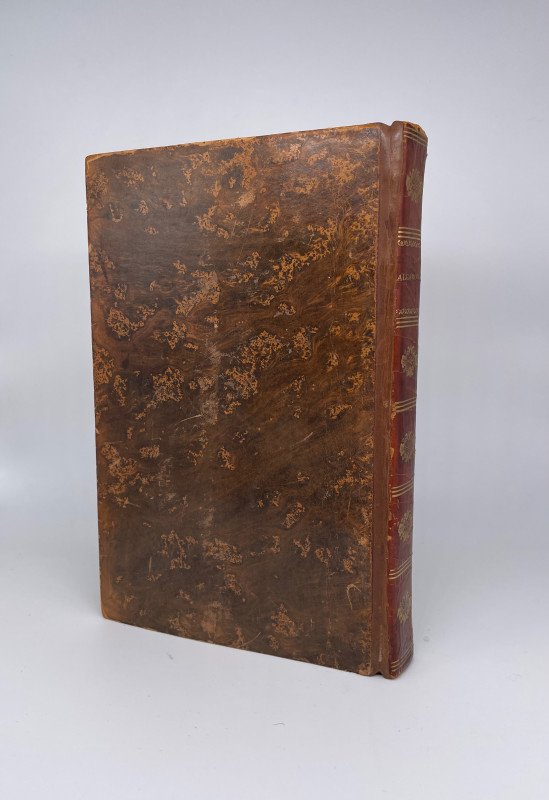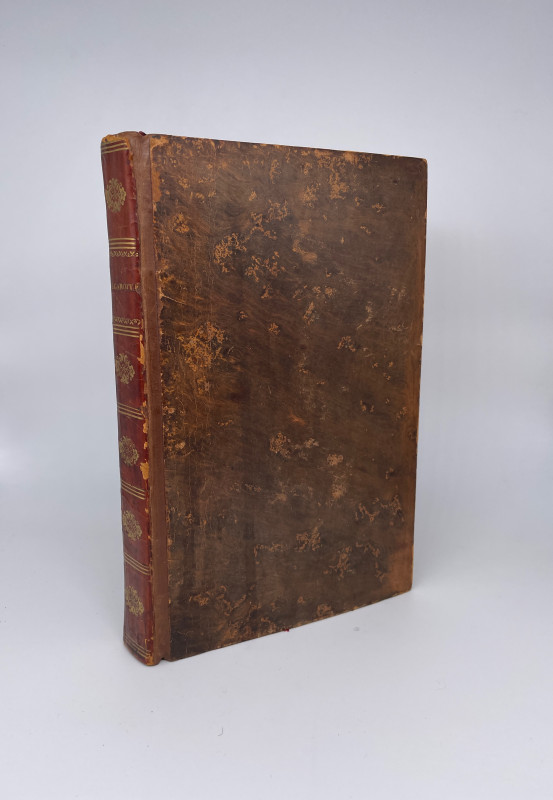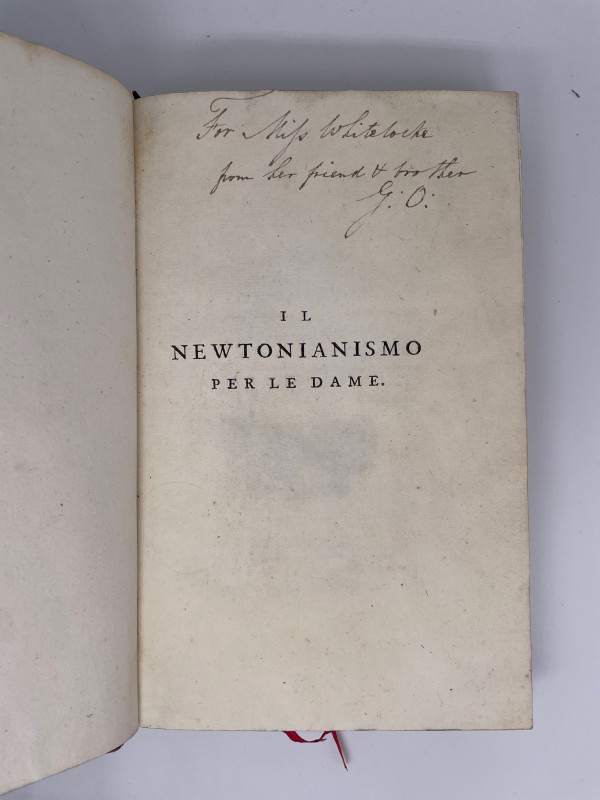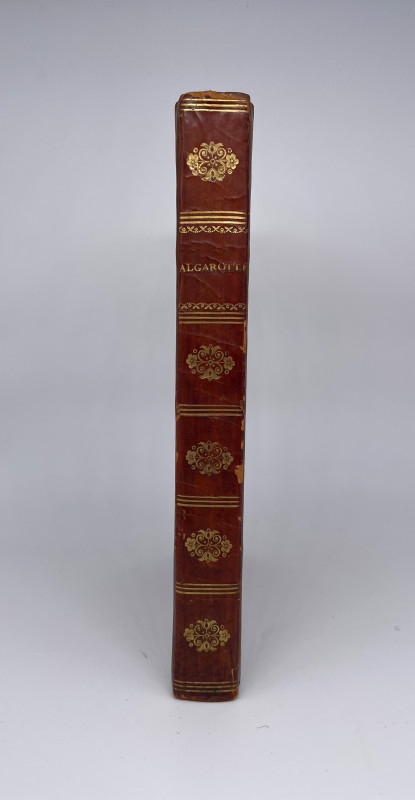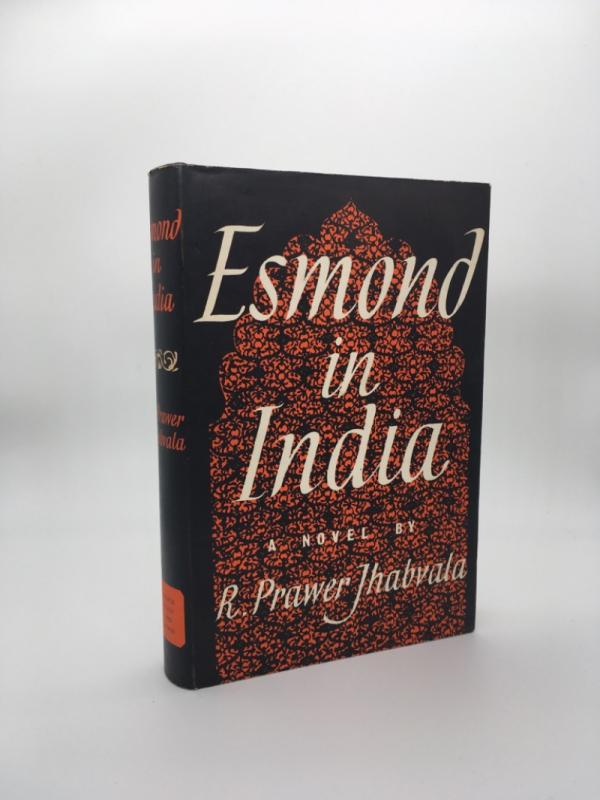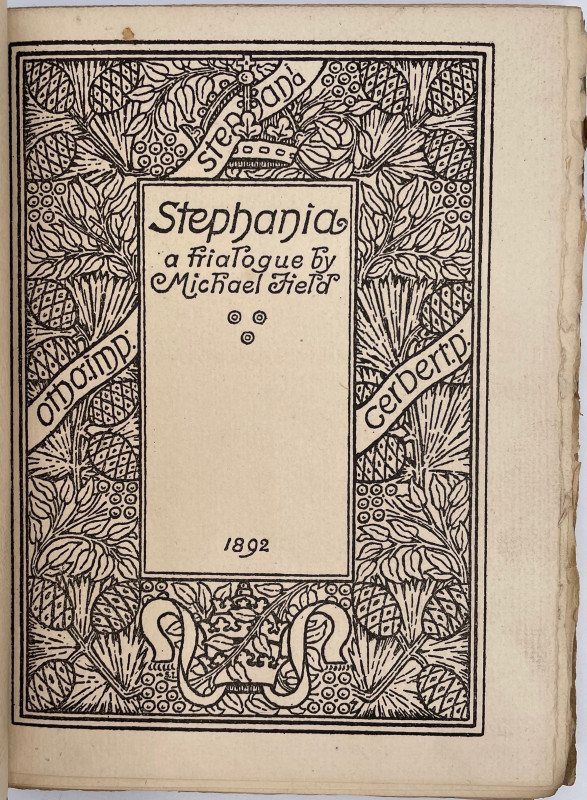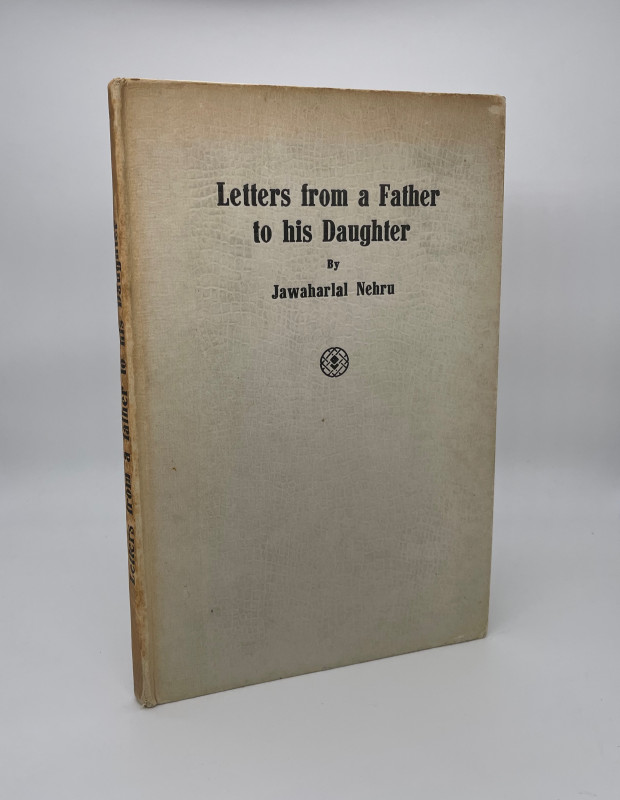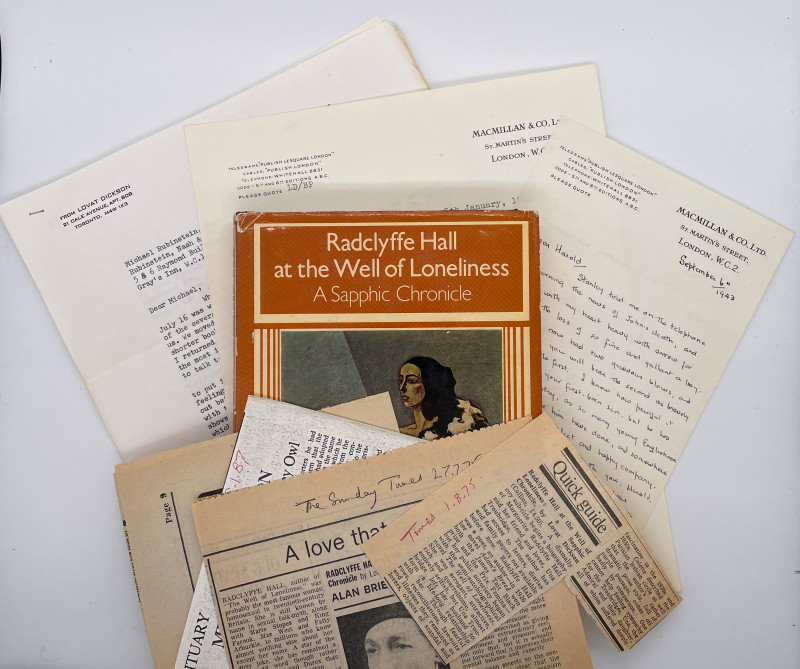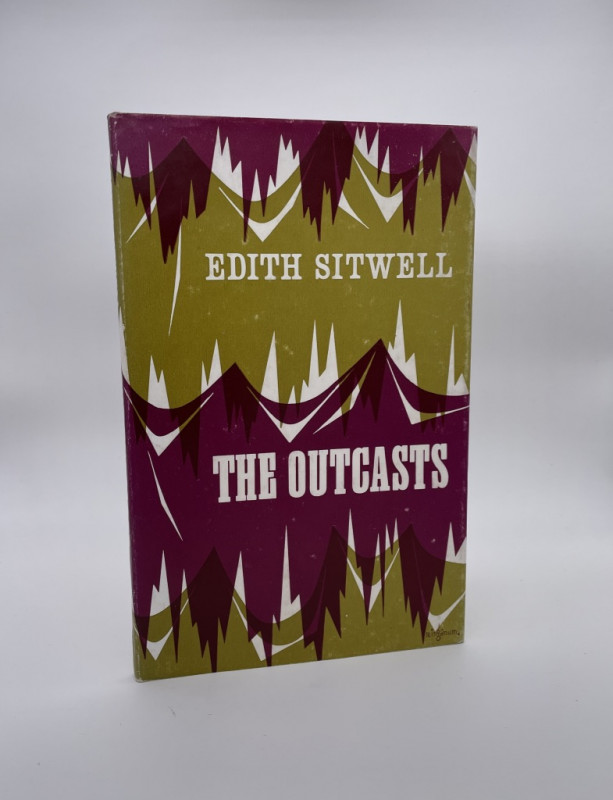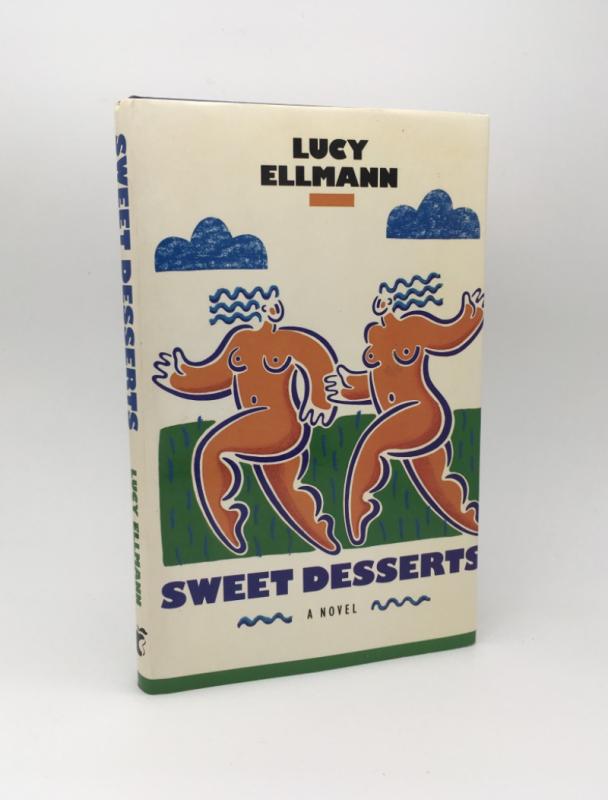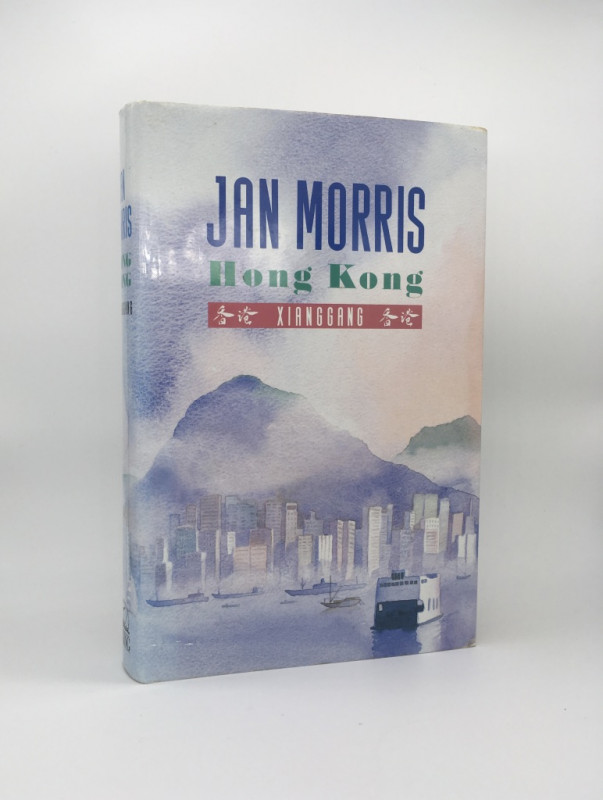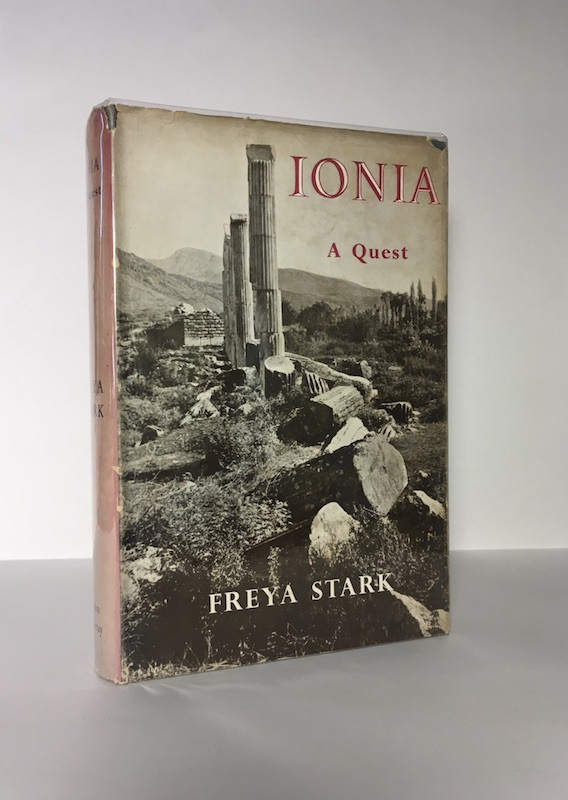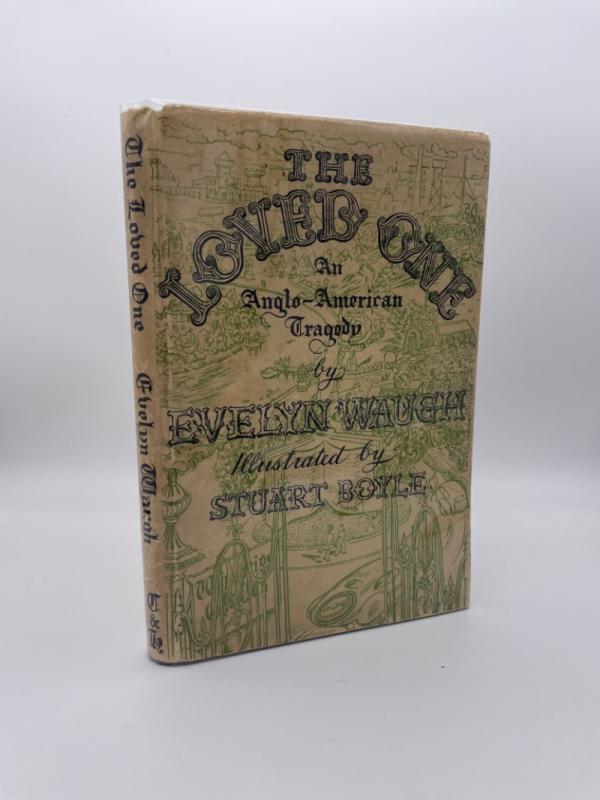Il Newtonianismo Per Le Dame, Ovvero Dialoghi sopra La Luce, I Colori, e L’Attrazione [Newtonianism for Ladies, Or Dialogues Concerning Light, Color, And Attraction.].
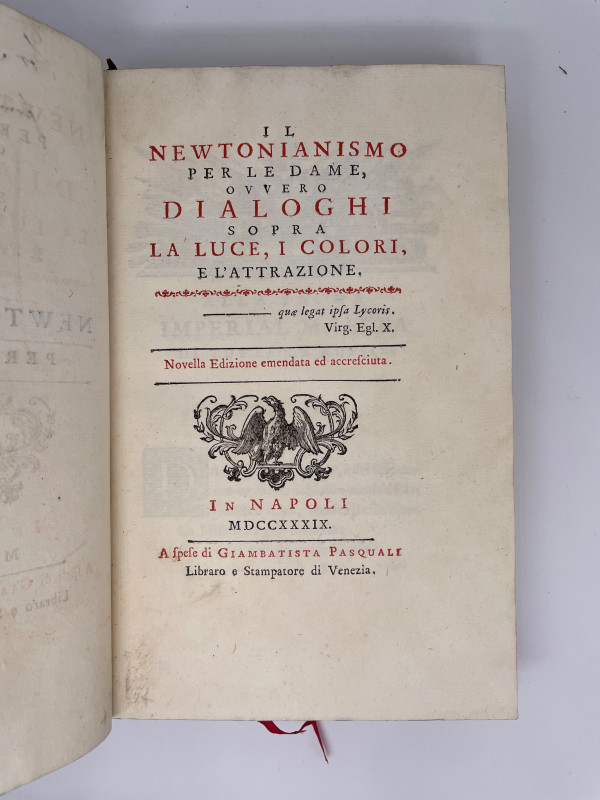
slide 2 of 5
slide 1 to 4 of 5
Book Description
Third edition: “Novella Edizione emendata ed accresciuta” (new edition, amended and enlarged). 8vo, pp. [xxiv], 303, half-title, title in red and black with engraved vignette, attractive engraved head- and tailpieces and decorative initials. Three-quarters tree calf, re-backed with original spine, lettered, ruled and tooled in gilt, laid back down, single gilt ruling to board edges. All edges marbled, red ribbon marker. Hinges professionally reinforced, chipped and rubbed, edgewear, bottom corner of bottom board bumped and chipped, attendant creasing into text block. Inscribed in sepia ink to half-title: “For Miss Whitelocke/ from her friend & brother/ G.O.,” (erroneous) pencil note about provenance to ffep, some off-setting from engravings, occasional fox spots, pencil scoring and grubby marks, small loss to rear fep. Else, clean and bright. A grand copy of this important popularisation of Newtonian optics, with an apt female provenance. Near fine. This edition fairly well represented in British and Irish research libraries, uncommon in the trade.
Dealer Notes
This best-selling exposition of Newtonian optics was originally published in 1737 and was one of the main channels through which both Newtonian ideas and experimental philosophy reached a wider public in continental Europe. In his “hybrid between a philosophical dialogue and a manual of style and good manners”, Algarotti describes a number of Newton’s experiments on the nature of light and colour via six dialogues between a chevalier and a marchioness, staged over five days in a villa near Lake Garda. Despite it’s light-hearted and conversational tone, which belies Algarotti’s radical aims, it was included in the 1739 Index of Prohibited Books (Mazzotti, 2004).
The third edition includes a dedication to ‘Her Sacred Imperial Majesty of All the Russias,’ four laudatory poems in English to My Lady Mary Wortley Montagu, My Lord Hervey, Signor Symmer and Signor B. Sillingfleet, an advertisement, a letter to Bernard le Bovier de Fontenelle (replacing the preface) and a sonnet by Voltaire. It closes with ‘Letters about the New System of Optics’ by Giovanni Rizzetti. An English translation, by Elizabeth Carter, Sir Isaac Newton's Philosophy Explain’d for the Use of Ladies: In six dialogues on light and colours, was published in the same year as the third edition, while a French translation had appeared in 1738. In subsequent editions of Newtonianismo, Algarotti sought to respond to Rome’s critiques and have it removed from the blacklist.
Count Francesco Algarotti (1712–1764) was an Italian polymath, philosopher and poet, art critic and collector, and an expert in Newtonianism, who had successfully reproduced some of Newton’s experiments on light and colour while studying in Bologna. As the dedications perhaps hint at, during his 1736 visit to Britain, during which Algarotti completed Newtonianismo, he became embroiled in a lively love-triangle with John Hervey and Lady Mary Wortley Montagu, both of whom were smitten.
Limerick-born Sir Gore Ouseley, 1st Baronet GCH, PC (1770–1844) was an Anglo-Irish trader, linguist (who taught himself Persian, Sanskrit and Arabic) and diplomat. Returning from business and diplomacy in India, Ouseley married Harriet Georgina Whitelocke (1787-1848) in 1806 and was made Baronet in 1808 (ODNB). He was appointed His Britannic Majesty's Ambassador Extraordinary and Plenipotentiary at the Court of Persia from 1810-1814, where he negotiated the 1812 Anglo-Persian Treaty and later mediated between Persia and Russia, culminating in the treaty of Gulistan in 1813. A founder member of the Royal Asiatic Society and President of the Society for the Publication of Oriental Texts, Ouseley created a magnificent collection of Oriental manuscripts, now held by the Bodleian in the 'Ouseley Additions' and 'Elliott' MSS.
Given his address to “friend and sister” it seems likely that Ouseley’s inscribee was his sister-in-law to be, Mary Jane Whitelocke, later Burdett. We might also speculate that the Whitelocke sisters were educated and interested in languages and natural philosophy, and that Ouseley, who was elected a Fellow of the Royal Society in 1812 and later corresponded with and entertained Sir John Herschel, believed in an Algarottian (and Fontenellean) ‘domestication of philosophy’.
The third edition includes a dedication to ‘Her Sacred Imperial Majesty of All the Russias,’ four laudatory poems in English to My Lady Mary Wortley Montagu, My Lord Hervey, Signor Symmer and Signor B. Sillingfleet, an advertisement, a letter to Bernard le Bovier de Fontenelle (replacing the preface) and a sonnet by Voltaire. It closes with ‘Letters about the New System of Optics’ by Giovanni Rizzetti. An English translation, by Elizabeth Carter, Sir Isaac Newton's Philosophy Explain’d for the Use of Ladies: In six dialogues on light and colours, was published in the same year as the third edition, while a French translation had appeared in 1738. In subsequent editions of Newtonianismo, Algarotti sought to respond to Rome’s critiques and have it removed from the blacklist.
Count Francesco Algarotti (1712–1764) was an Italian polymath, philosopher and poet, art critic and collector, and an expert in Newtonianism, who had successfully reproduced some of Newton’s experiments on light and colour while studying in Bologna. As the dedications perhaps hint at, during his 1736 visit to Britain, during which Algarotti completed Newtonianismo, he became embroiled in a lively love-triangle with John Hervey and Lady Mary Wortley Montagu, both of whom were smitten.
Limerick-born Sir Gore Ouseley, 1st Baronet GCH, PC (1770–1844) was an Anglo-Irish trader, linguist (who taught himself Persian, Sanskrit and Arabic) and diplomat. Returning from business and diplomacy in India, Ouseley married Harriet Georgina Whitelocke (1787-1848) in 1806 and was made Baronet in 1808 (ODNB). He was appointed His Britannic Majesty's Ambassador Extraordinary and Plenipotentiary at the Court of Persia from 1810-1814, where he negotiated the 1812 Anglo-Persian Treaty and later mediated between Persia and Russia, culminating in the treaty of Gulistan in 1813. A founder member of the Royal Asiatic Society and President of the Society for the Publication of Oriental Texts, Ouseley created a magnificent collection of Oriental manuscripts, now held by the Bodleian in the 'Ouseley Additions' and 'Elliott' MSS.
Given his address to “friend and sister” it seems likely that Ouseley’s inscribee was his sister-in-law to be, Mary Jane Whitelocke, later Burdett. We might also speculate that the Whitelocke sisters were educated and interested in languages and natural philosophy, and that Ouseley, who was elected a Fellow of the Royal Society in 1812 and later corresponded with and entertained Sir John Herschel, believed in an Algarottian (and Fontenellean) ‘domestication of philosophy’.
Author ALGAROTTI, Francesco; [GORE, Sir Ouseley]; [WHITELOCKE, Miss]
Date 1739
Publisher Naples [but not]: A spese di Giambatista Pasquali, Libraro e Stampatore di Venezia.,
Condition Near fine
Friends of the PBFA
For £10 get free entry to our fairs, updates from the PBFA and more.
Please email info@pbfa.org for more information
